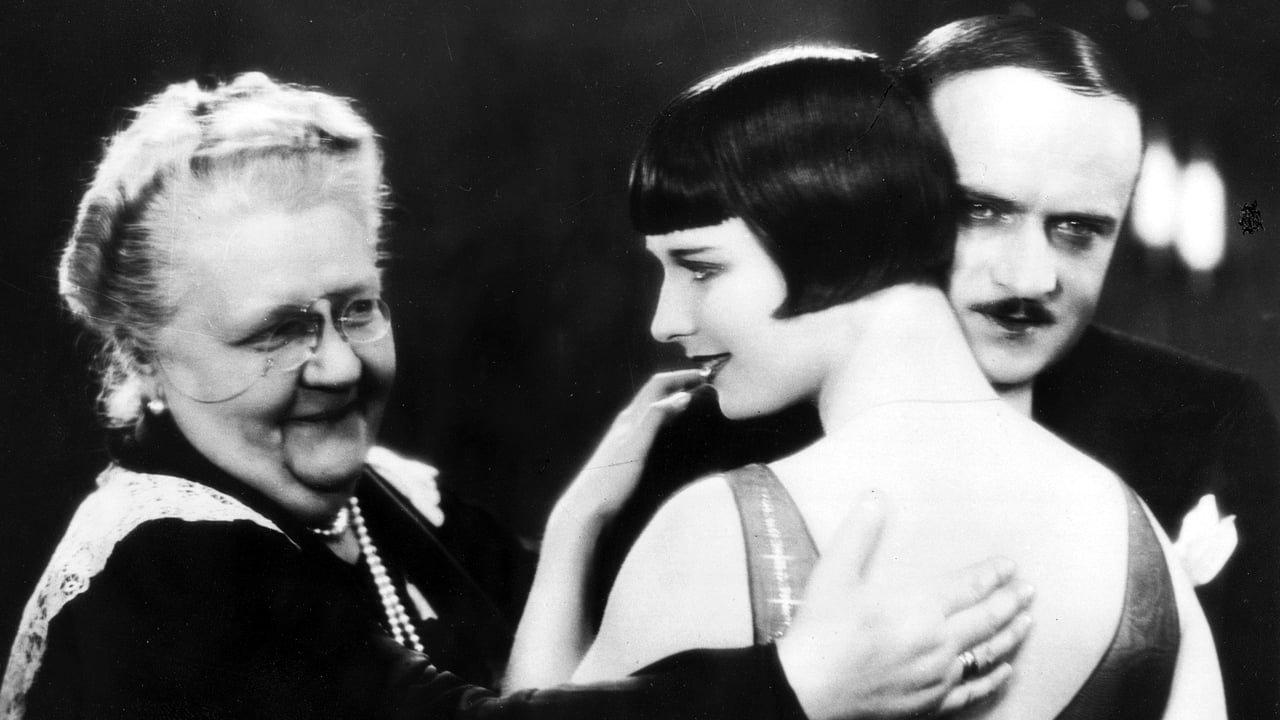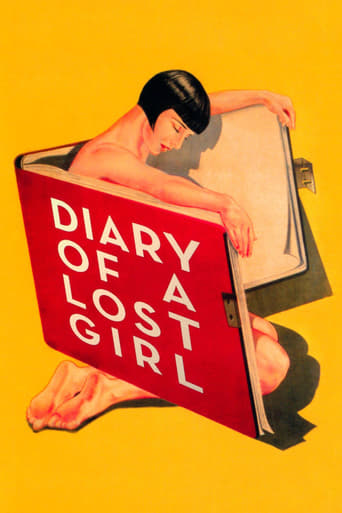

To me, this movie is perfection.
... View MoreSadly Over-hyped
... View MoreLet's be realistic.
... View MoreAll of these films share one commonality, that being a kind of emotional center that humanizes a cast of monsters.
... View MoreYou must have Pabst in your life at some point. Time it well, seek out a few silents beforehand. It was an exciting era for movies anyway, you're going to have a lot of fun. Context will be valuable. That is because Pabst does not set out to impress on the scope of Lang or Murnau, who impress easily, and you may be fooled that he's pretty ordinary. Not so. I rate him as the top German filmmaker of the time, the man had a truly subtle , humane touch that cut deep.It may seem as pretty ordinary, this one. It's melodrama about a hapless young girl who is neglected and abused: unwanted pregnancy, forced marriage, reformatory, prostitution. It is a journey of maturity that takes her through many worlds, most of them depressing. DW Griffith would have done this in somber , sanctimonious tones. Chaplin could do it frivolously, with a bit of kindly fate in the machine of sorrow. Pabst did it another way, and it's his way that most likely has influenced our contemporary understanding of cinematic melodrama as something quite pure and sophisticated.That sophistication is seeking ways to deliver both the redemptive story and many ways, different paths to reason and emotion, some of them shrouded in dream, and seems to have carried on from here to Sirk to elsewhere and Lynch.I want to devote this comment to all these items of, let's say, peripheral narrative vision. You can read up a description of the story in the other comments.There's Louise Brooks for one, exquisite beauty even among movie queens of the silent era. But Pabst was sensitive; unlike Sternberg in Blue Angel, he doesn't frame her for sex, trusting the male gaze to work the usual way anyway. Brooks both here and in Pandora's Box is a spirited , swanlike creature.There are four worlds that she travels through, possibly more. Each one revealed by the treatment of sex. The first is the parental nest, sex is covert yet (the tryst with the maid) and she is a sheltered child, naive and innocent of finer implications around her. The film begins portentously with a suicide and a man promising truth of the story. In a roundabout way he does, by exploiting sexual vulnerability.The second world is at the reformatory: it is a simplistic world with stock villains (matron - guard) where expressions of sexuality are forbidden. Here others administer decisions and she only has to obey the story. It is very much a stepdown into childhood, but in a way that is painfully clear to her (in the parent's nest, she had illusions of freedom). A revolt is staged and she escapes.What she doesn't know, is that she escapes to a high-class brothel. We find out as she does, when an envelope full of money arrives the morning after a night of drinking, merrymaking and sex. But - as sex enters the picture - so this is a world now where people are ambiguous figures, not always villains. Here a creep looking for sex is repudiated, only for the kind protector to assume his place: this man has noble aspirations to save the girls, but he'd much rather have a good time. He's a bit of a hypocrite, but it would be a puritanical stretch to think him bad. Here she learns to endure and persist.Now for the best part. The narrative is on the top level in the form of excerpts from a diary. But, you will note steadily the introduction of more and more subtle, visual dislocations from the ordinary. That male gaze mysteriously lulls her to sleep both times she has sex. Both times it's against her will, both times signify a turn in the gear of the world. The second time is accompanied by the bedroom door inexplicably opening ajar by its own self, and then the lover and a sedated Louise in his arms waltz into frame. It's a heady , seductive shot.It's obvious what Pabst is getting at - she succumbs to the role expected of her - but in doing so, succeeds in demanding from us a different set of reasoning tools for the rest of the film. There are several more shots of her asleep in the hands of men, as though dreaming her whole ordeal. Dance is a main thread, and wrapped around the recurring notion of deciding the depth of your performance.That different set of tools is, at the same time as the world around her changes, and demands each time a different response, getting to note semiconscious spillovers inside of her.This aspect of the work is amazing. Look how, in both the reformatory and brothel, she is part of a chorus of girls, usually framed with two or more girls hovering beside her, and it's that chorus instead of just herself that is experiencing the story, as though part of that fragile self has splintered by the trauma, and each splintered self has taken mirrored shape around her to shoulder part of the pain. (compare to the brothel scenes from Inland Empire)The fourth world is having learned to cope, and that allows her to return to the early stages of the story, starting with another scene of dance and frolicking by the beach, and eventually save one of those splintered selves from the same fate.Something to meditate upon.
... View MoreThe teenager Thymian Henning (Louise Brooks) lives with her father Karl Friedrich Henning and her aunt in a comfortable house. When the pregnant housekeeper Elisabeth (Sybille Schmitz) is fired, she commits suicide and is found drowned. Her father brings the new housekeeper Meta (Franziska Kinz) and sooner he flirts with her. Thymian is seduced by the pharmacist Meinert (Fritz Rasp) that rents her father's pharmacy downstairs. Thyamin gets pregnant and her father gives the baby Erika for a nanny and puts his daughter in a reformatory. Meanwhile, the idle Count Nicolas Osdorff (André Roanne) is left by his uncle to fend for himself. Karl Henning gets married with Meta and Thymian decides to escape from the boarding school helped by Count Osdorff.During the night, Thymian runs away from the reformatory with a friend that gives an address to Thymian and the Count. Sooner she finds that the place is a brothel and without any alternative to survive, she works in the place. Years later, her father dies and Thymian inherits everything. But she needs a new identity and she gets married with the Count and becomes a Countess. However, when she sees her little sister leaving the house with her little brother and Meta, she gives her fortune to the child. When Count Osdorff discovers that she had given up the fortune, he commits suicide. Now the Elder Count Osdorff (Arnold Korff) feels responsible for the death of his cousin and promises to assist Thymian to have a better life. But she is still haunted by her past. "Tagebuch einer Verlorenen", a.k.a. "Diary of a Lost Girl", is a masterpiece from Georg Wilhelm Pabst with a complex story of a teenager that has her life destroyed by the intolerance of her family after an irreparable mistake in the view of a 1929 society.The plot has many twists and subtle scenes, like the debut of Thymian in the brothel with the client kissing her and turning off the lampshade. Louise Brooks is among the most beautiful faces of the cinema history and her acting is stunning as usual. The Count's last sentence "- with a little more love, no one on this Earth would ever be lost!" closes this film with golden key. My vote is nine.Title (Brazil): "Diário de uma Garota Perdida" ("Diary of a Lost Girl")
... View MoreDiary of a Lost Girl (1929) *** (out of 4) Fairly raw German silent from director G.W. Pabst. A young woman (Louise Brooks) is raped and is eventually thrown out of her house when she has a baby. From here on the girl goes to a reform school, becomes a whore but will she find redemption? I was somewhat letdown by the film since I felt it did have a few flaws. I thought the men characters were really one sided and the second half of the film drags somewhat but there are certainly more positives than negatives. Brooks is terrific in the lead role and does a great job at showing off the virginal younger girl and the eventual sluttish, if mature, older woman. There's a scene where she's working and her father notices her. Within the same scene we see Brooks "slut" slide melt away into that virginal girl we saw at the end of the film in some of the best acting I've seen. The mood and atmosphere is very strong at the start of the film and the morality ending actually works quite nicely.
... View MoreLouise Brooks is luminous in this rather trite tale of a young girl's ruination and regeneration. The plot line founders toward the end but, as a whole, DIARY OF A LOST GIRL is notable for its arresting visuals and set-piece sequences. Unfortunately, we'll never see G.W. Pabst's original intent:"THE DIARY OF A LOST GIRL was based on the moralistic novel by Margarete Bohme... But the censors did not miss the point. They butchered DIARY more brutally than PANDORA. In the ending Pabst intended, Thymiane was to become the proprietress of her own high-class brothel, rejecting respectability in favor of the wealth and power that a rotten bourgeoisie could respect. But the censors insisted that Thymiane embrace precisely the kind of sentimental reformism that Pabst disdained, twisting the film into conformity with German middle-class values. Pabst capitulated because he had to coexist with them and because he would live to fight another day for such subsequent (and better) films as ...THE THREEPENNY OPERA... DOALG was a kind of sacrificial lamb, as its scenarist, Rudolf Leonhardt, affirms: 'Pabst's accommodating nature had already made him prepared to make two different endings -for vice, even involuntary vice, must not go rewarded. Where the censors had not forbidden passages beforehand, entire filmed sequences were cut without mercy later on...'" I love what there is of it (especially the brothel & reformatory scenes), but I was never in the majority:"But it was death, rather than immortality, that awaited DOALG at the box office upon its release... The influential critic Hans G. Lustig gave it a single withering paragraph in 'Der Tempel'... No serious criticism of DOALG could take place until three decades later...Lost on most critics was the fact that Pabst's technique in DOALG was different from that of PANDORA. Lotte Eisner, virtually alone, recognized a new, semi-documentary restraint: 'Pabst now seeks neither Expressionistic chiaroscuro nor Impressionistic glitter; and he seems less intoxicated than he was by the beauty of his actress."Highly recommended!
... View More